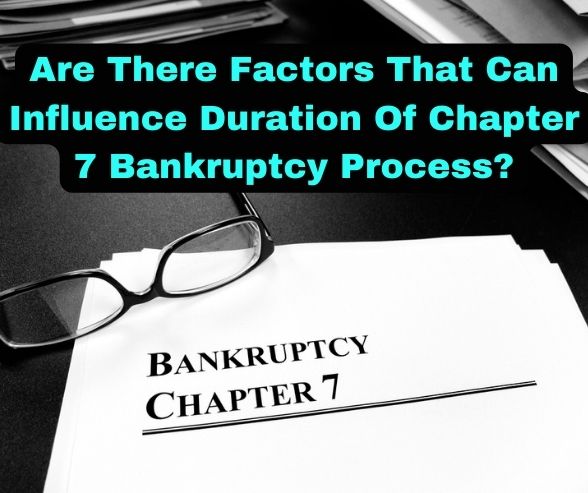If you’re considering filing for bankruptcy and have questions about the length of time it takes to complete a Chapter 7 case, you’re not alone. The duration of the process is primarily dependent on individual circumstances as every case is unique. In this blog post, we’ll look at some key factors that can influence how long the filing may take before your debt is discharged in court – allowing you to start fresh with your finances again.
Factors That Can Impact The Timeline Of A Ch 7 Bankruptcy
Filing for Chapter 7 Bankruptcy is a complex process that involves a lot of paperwork and legal procedures. One of the most important things to consider when going through this process is the timeline involved. There are several factors that can impact the timeline of a Chapter 7 Bankruptcy, such as the size and complexity of the case, the court’s workload, and the debtor’s cooperation with the trustee. In some cases, unexpected issues or disputes can arise, which can further delay the process. However, with the right legal support and careful planning, it is possible to manage these factors and navigate through the Chapter 7 Bankruptcy process as smoothly and efficiently as possible.
Debtor’s Ability To Pay Creditors
 When it comes to repayment plan negotiations with creditors, the debtor’s income level and ability to pay is a crucial factor. Creditors want to ensure that they will be able to recover their money, while debtors want to avoid being overwhelmed by the debt they owe. A debtor’s income level is scrutinized carefully, as it can determine their ability to meet the repayment obligations required by creditors. Accurately assessing this income data is important for both parties. Negotiations can hinge on whether a debtor can demonstrate the ability to pay back their creditors, and thus avoid the need for legal action. In such cases, it’s essential that debtors are aware of their rights and obligations and prepared to negotiate accordingly.
When it comes to repayment plan negotiations with creditors, the debtor’s income level and ability to pay is a crucial factor. Creditors want to ensure that they will be able to recover their money, while debtors want to avoid being overwhelmed by the debt they owe. A debtor’s income level is scrutinized carefully, as it can determine their ability to meet the repayment obligations required by creditors. Accurately assessing this income data is important for both parties. Negotiations can hinge on whether a debtor can demonstrate the ability to pay back their creditors, and thus avoid the need for legal action. In such cases, it’s essential that debtors are aware of their rights and obligations and prepared to negotiate accordingly.
Creditor’s Ability To Collect Payments From Debtor
When a debtor files for Chapter 7 bankruptcy, their assets are liquidated to pay off as much of their outstanding debts as possible. However, what happens if there isn’t enough to cover all the debts? This is where creditors’ ability to collect becomes crucial. Typically, once a debtor files for Chapter 7 bankruptcy, an automatic stay goes into effect, prohibiting creditors from pursuing collection efforts. However, there are certain exceptions to this rule, such as secured creditors who can request permission from the court to continue their collection efforts. It’s important to understand the nuances of the bankruptcy process and the rights of both debtors and creditors in this complex legal system.
Presence Of Any Prior Bankruptcies Filed By Debtor
When considering filing for chapter 7 bankruptcy, it is important to evaluate any prior bankruptcies that may have been filed. Previous filings can impact the eligibility for a chapter 7 bankruptcy, as there are time restrictions between filings. It is essential to consult a bankruptcy attorney in order to determine the next steps to take if a prior filing exists. A chapter 7 bankruptcy can provide relief for those who are struggling with overwhelming debt and are seeking a fresh start. It is important to weigh the benefits and potential consequences before making the decision to file.
Status Of Other Court Proceedings Involving Debtor Or Creditor
Filing for Chapter 7 bankruptcy is a serious decision that can drastically impact the financial future of both debtors and creditors alike. If you’re in the midst of navigating this process, it’s important to be aware of the status of other court proceedings involving you or your creditors. This could include ongoing lawsuits, collections, or even foreclosure proceedings. Staying informed and proactive about these matters can help ensure a smoother bankruptcy process and even minimize potential financial fallout. By working with a trusted bankruptcy attorney and staying up-to-date on all relevant court proceedings, you can move forward with confidence towards a brighter financial future.
Chapter 7 Bankruptcy Timeline
Bankruptcies are complicated, and the timeline of a Chapter 7 Bankruptcy depends on a variety of different factors. The debtor’s income level and ability to pay creditors are certainly important considerations. Creditors also play a critical role by having an ability to collect payments from the debtor. Prior bankruptcies filed by the debtor can drastically change the timeline in addition to any other court proceedings that are going on between debtor and creditor. It is best if all of these circumstances can be taken into account when predicting the timeline for a Chapter 7 Bankruptcy. Finally, since each individual case is unique, it is recommended you contact an attorney to evaluate your specific situation within the bankruptcy law concerning all of the factors stated before in order to obtain proper legal advice and determine what is best for you in regards to filing for chapter 7 bankruptcy.